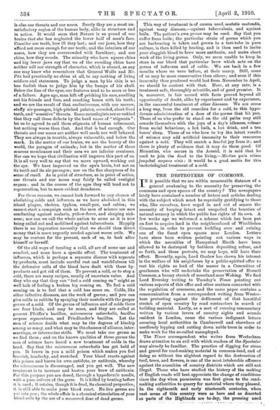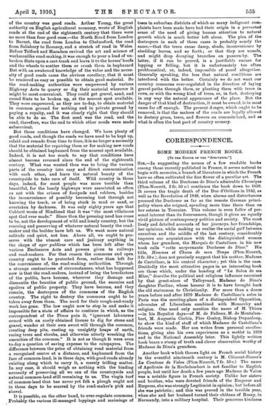THE DESTROYERS OF COMMONS.
IS it possible that we are within measurable distance of a general awakening to the necessity for preserving the commons and open spaces of the country ? The newspapers lately have contained a number of letters and articles dealing with the subject which must be especially gratifying to those who, like ourselves, have urged in and out of season the necessity of keeping intact and unspoiled the beauties of natural scenery in which the public has rights of its own. A few weeks ago we welcomed a scheme which has been put on foot to acquire land in the neighbourhood of Wimbledon Common, in order to prevent building over and ruining one of the finest open spaces near London. Letters have since been written pointing out various ways in which the amenities of Hampstead Heath have been allowed to be destroyed by builders depositing refuse, and so forth, and these protests, we may hope, will have their effect. Recently, again, Lord Onslow has shown his interest in the welfare of his neighbours by a public-spirited offer to vest his rights as lord of the manor in a Committee of gentlemen who will undertake the preservation of Horsell Common, a breezy stretch of moorland near Woking. We find Lord Eversley writing to Tuesday's Times pointing out various aspects of this offer and other matters connected with the regulation of commons, and the same paper contains a communication from a correspondent writing from Wester- ham protesting against the defilement of that beautiful stretch of open country by road contractors in search of building material. Lastly, as a sort of running commentary written by various lovers of country sights and sounds resident in London, come the various indignant letters accusing local authorities in Camberwell and elsewhere of needlessly lopping and cutting down noble trees in order to make work for the so-called unemployed.
The Times correspondent who writes from Westerharn draws attention to an evil with which readers of the Spectator may already be familiar. The practice of digging for stone and gravel for road-making material in common-land, and of doing so without the slightest regard to the destruction of turf, trees, and flowers, is one of the most intolerable offences against the amenities of country districts which are still not illegal. Those who have studied the history of the making of English roads will best appreciate the change of conditions since the day when permission was first given to the road- making authorities to quarry for material where they pleased. In the eighteenth and early nineteenth centuries, when vast areas of this country 'were as bare and as deserted as parts of the Highlands are to-day-, the pressing need
of the country was good roads. Arthur Young, the great authority on English agricultural economy, wrote of English roads at the end of the eighteenth century that there were no more than four good ones,—the North Road from London to Barnet, the road from London to Chelmsford, the road from Salisbury to Romney, and a stretch of road in Wales. Before Telford and Macadam revived the art and science of workmanlike road-making, it was enough to pour a load of un- broken flints upon a cart-track and leave it to the horses' hoofs and the wheels to scatter them or crush them in haphazard But with an awakened knowledge of the value and the neces- sity of good roads came the obvious corollary, that it must be rendered as easy as possible to obtain good material. So the road-making authorities were empowered by various Highway Acts to quarry or dig their material wherever it might be most convenient. They could get gravel, sand, and round flints to be broken up, at the nearest spot available. They were empowered, as they are to-day, to obtain material in common ground for nothing and in private ground by paying a royalty, and it was clearly right that they should be able to do so. The first need was the road, and the road, therefore, was the end to which other needs were made subservient.
But those conditions have changed. We have plenty of good roads, and though the roads we have need to be kept up, relaid and remade from time to time, it is no longer a. necessity that the material for repairing them or for making new roads should be obtained haphazard from the nearest spot available. Indeed, it is not too much to say that conditions have almost become reversed since the end of the eighteenth century. What was wanted then was to bring the various parts of the country into easy and direct communication with each other, and leave the natural beauty of the 'countryside to take care of itself. Wild country in those days, indeed, for most people was more terrible than beautiful, for the lonely highways were associated as often RS not with the crimes of footpads and robbers, besides the inconvenience of possibly becoming lost through not knowing the track, or of being stuck in mud or sand, or overtaken by darkness. It was only eighty years ago that Cobbett wrote of Hindhead that it was "the most villainous spot God ever made." Since then the pressing need has come to be, not the development of wild and lonely country, but the rescuing and preserving of whatever natural beauty the road- maker and the builder have left us. We want more natural solitude and quiet, not less. Above all, we ought to pre- serve with the utmost care and jealousy anything in the shape of ager publicus which has been left after the various Enclosures Acts and powers given to railways and road-makers. For that reason the commons and open country ought to be protected from, rather than left for the convenience of, the road-making authorities. Through a strange contrariness of circumstances, what has happened now is that the road-makers, instead of being the benefactors of the public, have become, wherever they damage and dismantle the beauties of public ground, the enemies and spoilers of public property. They have become, and they remain, the destroyers of the commons of the English country. The right to destroy the commons ought to be taken away from them. The need for their rough-and-ready work has gone. The law ought now to step in and make it impossible for a state of affairs to continue in which, as the correspondent of the Times puts it, "ignorant labourers armed• with an easily obtained license to dig for stone and gravel, wander at their own sweet will through the common, creating deep pits, casting up unsightly heaps of earth, razing trees and shrubs, and otherwise utterly wrecking the amenities of the common." It is not as though it were even to-day a. question of saving expense to the ratepayers. The difference between the price of obtaining road material from a recognised centre at a distance, and haphazard from the face of common-land, is in these days, with good roads already existing along which to carry it, a merely trifling matter. In any case, it should weigh as nothing with the binding necessity of preserving all we can of the countryside and natural common-land still remaining to us. The virgin turf of common-land that has never yet felt a plough ought not in these days to be scarred by the road-maker's pick and shovel.
It is possible, on the other hand, to over-regulate commons. . Probably the various ill-managed loppings and maimings of trees in suburban districts of which so many indignant com- plaints have been made have had their origin in a perverted sense of the need of giving human attention to natural growth which is much better left alone. The plea of the destroyers in each of these cases is probably nearly the same,—that the trees cause damp, shade, inconvenience by shedding leaves, and so forth ; or that they are unsafe, and might drop decaying branches on passers-by. The latter, if it can be proved, is a justifiable excuse for lopping or felling, but it is unfortunately too often problematical, or, indeed, impossible of proof altogether. Generally speaking, the less that natural conditions are interfered with the better. Certainly we do not want our country commons over-regulated in the direction of laying gravel paths through them, or planting them with trees in rows, or with the wrong kind of trees, or, in fact, destroying in any way the natural appearance of the place. But the danger of that kind of destruction, it must be owned, is in most cases far off enough. The present danger, which ought to be removed, is that the makers of the roads are legally allowed to destroy grass, trees, and flowers on commcin-land, and as what is often the beat part of country scenery.











































 Previous page
Previous page